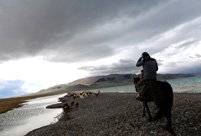 Not afraid of death
Not afraid of death
 Chen Guangbiao ads on A15 of NYT to host charity luncheon for 1,000 poor and destitute Americans
Chen Guangbiao ads on A15 of NYT to host charity luncheon for 1,000 poor and destitute Americans
 Passionate bar babies and fans feel the charm of World Cup 2014
Passionate bar babies and fans feel the charm of World Cup 2014
 US aircraft carrier docks in HK, welcomes PLA aboard
US aircraft carrier docks in HK, welcomes PLA aboard
 Graduation season: 'Take graduation photos to mark our love'
Graduation season: 'Take graduation photos to mark our love'
 College-student-turned nun becomes famous on Internet
College-student-turned nun becomes famous on Internet
 Japanese airplanes tail Chinese warplane in China's ADIZ
Japanese airplanes tail Chinese warplane in China's ADIZ
 China applies for UNESCO listing of Nanjing documents
China applies for UNESCO listing of Nanjing documents
 Picturesque scenery in Hongcun Village
Picturesque scenery in Hongcun Village
 Japan's PM vows to resume commercial whale hunt
Japan's PM vows to resume commercial whale hunt
BEIJING, June 22 -- In an article carried by Sunday's China Daily, a Beijing-based international relations expert warned that China should be "particularly vigilant" of Vietnam's trick to depict itself as a "victim" in the South China Sea dispute.
Lu Yang, a Beijing-based scholar, wrote in his article that Vietnam intended to orchestrate a self-injury scenario to slander China for taking advantage of its stronger national strength to "bully the weaker", so as to win sympathies and support.
He suggested that China should avoid head-on clashes from troublemaking Vietnamese vessels and collect and publish evidence on provocative Vietnamese behaviors.
Following is the full text of Lu's commentary:
Since May 2, when a Chinese oil rig started drilling in the waters near Zhongjian Island of China's Xisha Islands, Vietnam has sent a large number of vessels, including armed ones, near the site to forcibly interrupt and stop the normal operation of the Chinese oil platform.
After its failed attempt because of some effective countermeasures taken by China, the Vietnamese government has turned to a variety of ploys in an attempt to launch a new round of offensives against China.
Harboring the intention of pushing for the flare-up of disputes with China in the South China Sea, Vietnam has not let slip any possible means, even extreme ones.
For example, the Vietnamese government connived and even incited anti-China demonstrations in its country. But these demonstrations went so far that they spiraled out of control and evolved into violent crimes, including looting and arson, mainly targeted at foreign ventures based in Vietnam.
Like a person going for wool but coming home shorn, a series of activities conducted by Vietnam aimed at tainting China has turned out to have tarnished its own international image.
Such an outcome has not caused the Vietnamese government to feel remorse or make any self-reflections.
Instead, it has taken continuous moves to make much of the disputes with China, trying to distort facts on various international occasions it can use in an attempt to confuse right and wrong, smear China's image and deliberately cause a kind of strained atmosphere.
China should remain particularly vigilant of an old trick among others that have been frequently used by Vietnam. That is, some foreign journalists were invited aboard Vietnam's vessels that came to the operating site of the Chinese oil rig so that they could see Vietnamese vessels "rammed" by China's.
With such kind of intentional arrangement, the Vietnamese government attempted to overstate the so-called China threat at sea, especially following the overturning of a Vietnamese fishing boat on May 26 after it rammed against a Chinese patrol vessel.
With some recent vessel-clash incidents plotted by Vietnam, in which its own vessels failed to gain an upper hand over Chinese ones, Hanoi has tried to depict itself as a "victim".
However, such behavior by Vietnam has caused people to doubt its self-orchestrated "self-injury" ploy to court sympathies from the international community.
Vietnam's recent moves and its practical needs have backed up people's suspicions.
First, to cover up its behavior interrupting China's reasonable, legitimate and normal drilling operations in the waters under China's jurisdiction and cook up the fact China operates in the "contested" waters, Vietnam may feel the need for orchestrating a self-injury scenario to slander China for taking advantage of its stronger national strength to "bully the weaker" and cheat international opinion.
Second, in Hanoi's eyes, it does need to present to the international community its image as a "victim" to gain sympathies and support from countries blinded to the truth and those harboring evil purposes. This, Vietnam believes, can win itself a broader confrontational front against China and thus restrain "China's illegal activities".
Third, Vietnam has declared many times that it has made full preparations and is now awaiting chances to submit a motion for international arbitration.
To win such a man-made "international case", Hanoi has also concocted a batch of so-called evidence, such as "facts" about China's "illegal behavior" at sea, in a move to bring China to the "defendant's seat".
An analysis of Vietnam's motives and a series of recent behavior it has conducted in the South China Sea targeted at China's normal drilling will help people conclude that Hanoi has not only converted its plan of man-made collisions with China into actual actions but also has motivations to continue directing such a farce.
Facing such filthy tactics from Vietnam, China's vessels patrolling around its oil rig should remain highly vigilant and, if possible, try to avoid head-on clashes from troublemaking Vietnamese vessels.
China should also collect and preserve evidence on provocative Vietnamese behaviors and make them public to the media and the international community to lay bare any ulterior Vietnamese motives.
Making open to the international community the facts about the South China Sea dispute will make world people understand that Vietnam's request for so-called international arbitration is nothing but an absurd act.
It is known that the Xisha Islands are an indisputable part of China's inherent territory. And China's normal oil drilling in the waters of these islands is a matter completely within the range of its sovereignty that is not against international law but a sovereign right endowed by the United Nations Convention on the Law of the Sea. Any Vietnamese attempt to abuse international law will come to no avail.
If the Vietnamese party stubbornly persists in its act of man-made vessel collisions with China in China's waters, China might take some countermeasures based on domestic laws.
After all, to exercise a domestic judicial jurisdiction over the waters of the Xisha Islands, over which it holds sovereignty, is China's internal affair that should allow for any outside criticisms.
 Stewardesses in Brazilian soccer jerseys
Stewardesses in Brazilian soccer jerseys Puzhehei: land of idyllic beauty
Puzhehei: land of idyllic beauty Chinese navy fleet visits Cape Town, South Africa
Chinese navy fleet visits Cape Town, South Africa PLA naval cadets toss their hats at graduation ceremony
PLA naval cadets toss their hats at graduation ceremony Graduation photo ideas: reliable alumnus and happy alumna
Graduation photo ideas: reliable alumnus and happy alumna Super daddies in 2014 World Cup
Super daddies in 2014 World Cup College girls take stylish photos to help enrollment
College girls take stylish photos to help enrollment Rebuilding the silk road
Rebuilding the silk road Top 10 Chinese products scoring World Cup goal
Top 10 Chinese products scoring World Cup goal In Pictures: Female fans of World Cup
In Pictures: Female fans of World Cup China's top 10 representative architectures
China's top 10 representative architectures Photo story: A day of 'mini girl'
Photo story: A day of 'mini girl' Top 20 hottest women in the world in 2014
Top 20 hottest women in the world in 2014  Cute animals' leisure summer in zoo
Cute animals' leisure summer in zoo Exhibition of the Buddha held in Tibet
Exhibition of the Buddha held in TibetDay|Week|Month